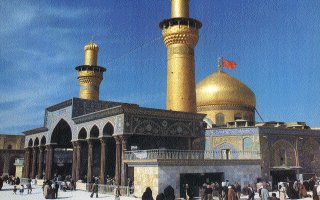Karbala
|
|
Karbalā' (Template:Lang-ar; also transliterated as Kerbala or Kerbela) is a city in Iraq, located about 100 km southwest of Baghdad at 32.61°N, 44.08°E. The name Karbala is derived from the word 'Karb' means sorrow, and 'Balā' means disaster. In the time of Husain's life, the place was also known as Al-Ghadiriyah, Nainawa, and Syathi'ul-Furat. The estimated population in 2003 was 572,300 people. It is the capital of Al Karbala Province. Shi'a Muslims consider it to be one of the holiest places in the world, second only to Mecca and Najaf.
About the city
The city is one of Iraq's wealthiest, profiting both from religious visitors and its agricultural produce, especially dates. It is split into two districts, "Old Karbala", the religious centre, and "New Karbala", the residential district containing Islamic schools and government buildings.
At the centre of the old city is the Mashad al-Husain, the tomb of Husayn bin Ali, the grandson of the Prophet Muhammad by his daughter Fatima and Ali ibn Abi Talib. Husain's tomb is a place of pilgrimage for many Shi'a Muslims, especially on the anniversary of the battle, the Day of Aashurah. Many elderly pilgrims travel there to await death, as they believe the tomb to be one of the gates to paradise. Another focal point of the Shi'a pilgrimage to Karbala is al-Makhayam, traditionally believed to be the location of Husain's camp, where the martyrdom of Husain and his followers is publicly commemorated. The city's association with Shi'a Islam have made it a centre of religious instruction as well as worship; it has more than 100 mosques and 23 religious schools, of which possibly the most famous is that of Ibn Fahid, constructed some 440 years ago.
History of Karbala
The city is extremely ancient – its name is variously said to be derived from Assyrian, Babylonian or Persian roots and it was in use as a Christian graveyard prior to the Islamic conquest.
Karbala's prominence in Shi'a Islam is the result of the Battle of Karbala, fought on the site of the modern city on the 10th of Muharram in 61 A.H. (October 10, 680). Both Husain and his brother Abbas were buried by the local Bani Asad tribe at what later became known as the Mashad al-Husain. The city grew up around the tombs, though the date of construction of the first sanctuary is not known.
The city and tombs were greatly expanded by successive Muslim rulers, but suffered repeated destruction from attacking armies. The original shrine was destroyed by the Abbasid Caliph al-Mutawakkil in 235 A.H. (850) but was rebuilt in its present form around 369 A.H. (979), only to be partly destroyed by fire in 1086 and rebuilt yet again. Like Najaf, the city suffered from severe water shortages which were only resolved in the early 18th century by building a dam at the head of the Husayniyya canal. In 1737 the city replaced Isfahan in Iran as the main centre of Shi'a scholarship. It suffered severe damage in 1801 when an invading Wahhabi army sacked the city, which is why many Shi'ites today consider the Wahhabi to be kafirs. Following the Wahhabi invasion, the city's sheikhs established a self-governing republic which was ended by a reimposition of Ottoman rule in 1843. This prompted many students and scholars to move to Najaf, which became the main Shi'a religious centre.
Karbala's development was strongly influenced by the Persians, who were the dominant community for many years (making up 75% of the city's population by the early 20th century). The Kammuna family, relatives of the Shah of Iran, were custodians of the shrines for many years and effectively ran the city until it fell under the control of the British Empire in 1915. The Persian influence was deliberately reduced under British rule, with a series of nationality laws (such as a prohibition on foreigners occupying government posts) being introduced to squeeze out the Persian community. By 1957, they accounted for only 12% of the city's population. They were subsequently assimilated into the Iraqi population, accepting Iraqi nationality.
The association of the city with Shi'a religious traditions led to it being treated with suspicion by Iraq's Sunni rulers. Under Saddam Hussein's rule, Shi'a religious observances in the city were greatly restricted and many non-Iraqi Shi'as were not permitted to travel there at all. In 1991, the city was badly damaged and many killed when a rebellion by local Shi'as was put down with great brutality by Saddam's regime. The 2004 pilgrimage was the largest for decades, with over a million people attending. It was marred by bomb attacks on March 2, 2004 (10 Muharram 1425 A.H.), now known as the Ashoura Massacre, which killed and wounded hundreds despite tight security in the city.
See also
- Shia News (http://www.shianews.com/)
- Answering-Ansar.org (http://www.answering-ansar.org/)
- List of places in Iraq
- List of Holy Citiesbg:Кербала
da:Karbala de:Kerbela es:Al Karbala fr:Kerbala id:Karbala nl:Karbala ja:カルバラー sv:Karbala


